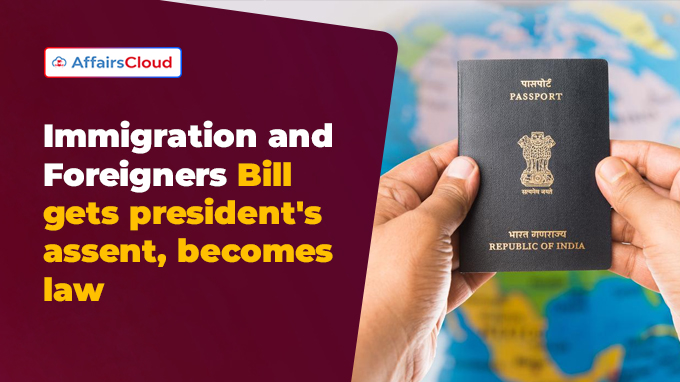 In April 2025, the President of India, Draupadi Murmu gave assent to ‘Immigration and Foreigners Bill, 2025’ which deals with issues related to foreigner and immigration and it was subsequently notified through a gazette notification, with this, the bill has now become a new law.
In April 2025, the President of India, Draupadi Murmu gave assent to ‘Immigration and Foreigners Bill, 2025’ which deals with issues related to foreigner and immigration and it was subsequently notified through a gazette notification, with this, the bill has now become a new law.
- The primary objective of this new act is to enhance national security, control immigration procedures, and introduce stringent penalties on foreigners who violate entry and stay conditions.
- The new act has repealed 4 British- colonial era laws, including the Passport (Entry into India) Act, 1920; the Registration of Foreigners Act, 1939; the Foreigners Act, 1946 and the Immigration (Carriers’ Liability) Act, 2000.
Background:
i.On March 11 2025, Union Minister of State (MoS) Nityanand Rai, Ministry of Home Affairs (MHA) introduced the ‘Immigration and Foreigners Bill, 2025’ in Lok Sabha (Lower house of the Parliament) and was passed on March 27, 2025.
ii.It was then passed by Rajya Sabha (Upper House of the Parliament) on April 2, 2025.
Key provisions of Immigration and Foreigners Bill, 2025:
i.Restrictions on Entry for Foreigners: The Act has specified that any foreigner who poses threat to national security, sovereignty or the integrity of India will not be allowed into the country or will be denied the permission to stay in India.
ii.Immigration posts for entry or exit: The Act has empowered the Central Government to designate immigration posts for entry or exit from India at such places as may be specified.
iii.Setting Up of Bureau of Immigration: The new Act has a provision of setting up of the Bureau of Immigration, which will perform immigration functions and other prescribed functions like: issuance of visa and regulation of entry into India, or transit, stay and movement within and exit from India.
- The central government has been empowered to appoint a Commissioner of the Bureau, which will supervise immigration and other prescribed functions.
iv.Registration of Foreigners with restricted movement: As per the Act, foreigners on their arrival in India are required to register with a Registration Officer.
- The Act also contains certain provisions which may restrict their movement, name changes, and access to protected and restricted areas.
v.Obligations of persons/entities to provide prescribed information: All international airlines and ships landing in India are now required to provide information of crew/passengers on board to a civil authority or immigration officer.
- It is mandatory for all hotels, universities, other educational institutions, hospitals and nursing homes to report about foreigners to concerned authorities, this will enable tracking of overstaying foreigners.
vi.Expansion of definition of Carriers: The new Act has expanded the definition of carrier which now include transportation of passengers and cargo by air, water, or, land through aircraft, ship, or any other mode of transport.
- Also, no aircrafts/vessels/ any other mode of transport will depart from India until they receive a clearance from the Immigration Officer.
- This clearance will be granted following the submission of prescribed general declaration.
vii.Offences and penalties: The Act has provision to impose penalties on foreigners entering without valid passport or other travel documents with maximum imprisonment of 5 years, fine up to Rs 5 lakh or both.
- Also, any person found to be using a forged passport or visa for entering into India or staying in or exiting from the country will be punishable with imprisonment from 2 to 7 years and a fine from Rs 1 lakh to Rs 10 lakh.
viii.Liability of Transport Carrier Penalty: If a carrier contravenes the provisions of the concerned Act, will be liable to a penalty which may extend to Rs 50,000.
- Also, in cases where civil authority or Immigration Officer is of the opinion that any carrier has brought, a person in contravention of the provisions of the act, will be liable to penalty at least Rs 2lakh, which may extend to Rs 5 lakh.
ix.Power of Arrest: The Act has specified that police officers not below the rank of a Head Constable to arrest without warrant.
About Ministry of Home Affairs(MHA):
Union Minister– Amit Shah (Constituency- Gandhinagar, Gujarat)
Minister of State (MoS)- Nityanand Rai (Constituency- Ujiarpur, Bihar); Bandi Sanjay Kumar (Constituency- Karimnagar, Telangana)




